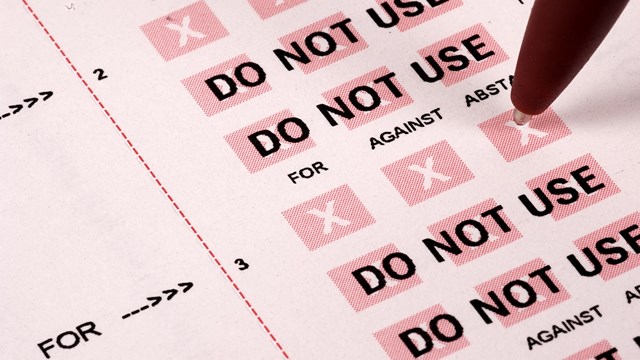
Every condo development and HOA has a board of directors in charge of governing the community’s finances, physical maintenance and other day-to-day business. The board is not just a group that runs the association, however—it is also a group that runs the business. Part of that responsibility is to keep the community fiscally sound, and to make sure the process of choosing new leaders is transparent and above reproach.
“You have to have an election, pursuant to bylaws,” says David J. Byrne, Esq., a shareholder and attorney with the Lawrenceville-based law firm of Stark and Stark. “If you’re run by a board, you have to have an election—it’s just a question of when.”
So how often must an HOA hold elections, and how must those results be tabulated in order to assure a fair and honest election in which everyone's voice is heard and accounted for? Let's take a look.
How it's Done
Boards are generally elected by HOA residents, but the process by which this happens varies from one community to the next because of variations in different communities' bylaws. Residents elected to the board bring a variety of skills to the office, but obviously not all directors or trustees are equally knowledgeable in all the aspects of their job. Conducting elections of new board members is one task that the board can flub—sommetimes with disastrous results.
Residents of a community who believe an election was conducted improperly can challenge the results of that election. The matter can wind up in court, costing everyone a great deal of money, time, and energy. In the process, neighbor can be pitted against neighbor and hard feelings can unwittingly be engendered—sometimes over what is fundamentally just a misunderstanding of how to conduct a proper community election.
Nobody wants to wind up being viewed as a possible cheat by his neighbor just because his HOA's election rules weren’t specific enough, or because board members themselves weren’t aware of how to run the process correctly. That’s why it is essential to understand the proper election procedures, and run things in accordance with them. A properly run election helps to avoid even the appearance of impropriety and reduces the risk of expensive legal challenges.
Democracy Working
In general, buildings and HOAs have rules for elections detailed in their bylaws. Most call for a yearly election of board members, usually to take place at the annual resident meeting. “Every condo and co-op has bylaws,” says Linda Gibbs, executive director of the Honest Ballot Association based in Floral Park, New York. The organization was started by Theodore Roosevelt in 1909 to run fair and honest elections. “They have to go according to the bylaws—usually annual meetings, elections once a year.”
The board and/or property manager are responsible for promoting an election to community association residents and for facilitating the election process, Gibbs continues. Generally, the community’s bylaws require that a written notice of the election be sent to residents in advance of the vote—usually at least 10 days and no more than 40 days prior to the election. Residents should consult their community’s bylaws to see when notice of the election must be sent.
In addition to being incorporated into every set of co-op or condo governing documents, “There is also a law covering it: the Non-Profit Corporations Act,” says Bruce Freeman, a partner with the law firm of Woehling & Freeman in Westfield.
Sometimes, the bylaws go so far as to specify the month when the elections will occur although such specificity is not necessary. Boards usually hold elections in the spring, after the community’s financial statements are ready—anywhere from April through June.
In most cases, the entire slate of board members is replaced—or at least voted upon. Each of the board members is usually elected to serve a 1-year term. Though common practice, replacing a board entirely from one year to the next can cause gaps in an HOA's institutional memory. Inexperienced board members who join the board far behind the knowledge curve often make rookie mistakes that might be avoided with more guidance from senior board members.
That inefficiency is leading many boards to consider changing their bylaws to have board members elected on a staggered or rotating term basis, so that there is some continuity of experience on the board, says Byrne. For example, in year one, the president and secretary are up for election, and in year two, the vice president and treasurer. This staggering of positions is becoming more and more common in HOAs across the country. “Staggered terms are very common,” says Byrne. “And they are the best way to operate.” After all, he continues, boards of directors are not hockey teams, where there are teams within the team that work different shifts. If two directors remain on a board from one year to the next, they can keep alive the association's institutional memory, and help things run more smoothly.
Getting Out the Vote
It's an oft-repeated truism that when a board does its job well and an association runs smoothly, residents tend to become apathetic. Some won't even bother to attend the annual meeting, making it difficult to attain a quorum—that is, a majority of unit owners attending or casting their votes by proxy through another voter. Failure to achieve a quorum will mean that no board business can be conducted – and that includes the election of board members.
It is not entirely uncommon for a board of directors at an annual meeting to physically send people out to collect written proxy votes from residents in their units so a quorum may be reached and an election held. The distribution, collection, verification and tallying of the proxy votes is a matter that can be complicated, and sometimes is best left to a tabulation or election coordinating company.
Usually, a paper proxy ballot is sent to voters in a building or HOA at the same time the election notice is sent. The unit owner can sometimes fill out the proxy and send it back to whoever is running election—the management company, attorney, or election coordinating company—or a designated agent for the voter, such as another unit owner. Sometimes, residents appointed by the board as inspectors of elections will help with the collection of proxy votes.
Vital as they are, proxies can sometimes be a big pain, both to collect and to tabulate. “It’s always a problem with proxies,” says Gibbs. “Candidates knock on doors, they try to get proxy votes. It’s a matter of who got there first.”
Gibbs says that sometimes, Candidate A will go to the door and get Resident X to sign a proxy. Later, Candidate B will show up, and Resident X will change her mind. Then, Resident X may show up at the meeting anyway, only to vote for Candidate C. This can give migraines to whoever is in change of collecting ballots.
Getting Help
Dealing with the proxies and with the other ballots cast in an election can be tricky tasks, especially in an election in which seats on the board are being hotly contested. For that reason, some boards simply opt to employ a professional tabulation company to run their elections.
Tabulation companies make what can sometimes be a difficult election process run smoothly, so that results are rarely contested—and if they are, they're less likely to be overturned in court. Hiring any outside professional such as a lawyer or tabulation company to oversee the election will help to provide some transparency in the process. And, says Byrne, when residents approve of the way in which the election was run, as they usually do when an objective third party is brought in to handle voting and tabulation, they're more likely to accept the results of the election.
Transparency is important in the election process, say the pros, which makes the selection of an election inspector equally important. Despite the lofty title, inspectors of elections are people from the audience chosen to do the duty.
“They don’t have to be lawyers or professionals,” says Byrne. “They can’t be the candidates, obviously, and they can’t be affiliated with the candidates,” i.e., spouses, children, parents, roommates, and so forth. “When I’m running elections, I like to have inspectors,” says Byrne. “It gets people involved in the process.”
Getting a tabulation company to help your association carry out an election can be more helpful than simply having people on-hand to count ballots. “We write the election paperwork in layman’s terms so people understand it and the process goes more smoothly,” Gibbs says. “Election companies can help with the wording of election literature, to create a better line of communication in the vote.”
Counting—and Contesting—Votes
Most often, votes for boards of directors are done by paper ballot. In some rare cases, votes are done by hand—though that method is discouraged by professionals familiar with best practices for community elections, since having a concrete record of the vote is essential.
Often in building elections, employees of the management company count the votes, with the oversight of inspectors of election, who, as Byrne pointed out, are appointed by the board. Usually the voters’ ballots are sealed and either collected by inspectors or placed by voters in a ballot box prior to the tally. While regular elections are annual events, it's possible that residents might initiate a special election, if they feel it’s needed—such as in cases of board misconduct or disfavor.
If an HOA's members feel that an election was held in bad faith, or was simply mishandled, there are steps that can be taken for legal redress, says Hubert C. Cutolo, Esq., of Edison-based law firm Sodini & Spina.
“The Planned Real Estate Development Full Disclosure Act (PREDFDA) requires fair and open elections for New Jersey HOA boards,” he says. “[A] board must exercise their legislatively established powers in a manner that promotes the goal of fair and open elections. Most governing documents contain provisions that outline a basic agenda for elections and also contain procedures—such as the appointment of inspectors—for elections. The appointment of neutral inspectors can help avoid charges of tampering that may occur if ‘concerned parties’ are involved in the tabulation of ballots. Board[s] should seek to avoid even the appearance of impropriety.”
Residents with complaints about how their board has conducted an election can contact the New Jersey Department of Community Affairs (DCA) and notify them of the concern with how the process was handled, says Cutolo. The DCA may then assist the board in implementing a more fair and open process.
If an HOA board outright refuses to hold new elections when residents are demanding them, or ignores complaints of election mishandling, residents can and sometimes do go to court to get a new election. Such steps are rare however, says Freeman.“If there’s a challenge to an election, the state, through the Non-Profit Corporations Act, says that the challenge first goes to the inspectors of elections, and then to Superior Court.
The fact that boards must not only run their HOA's election process, but that they are themselves elected by their fellow residents, and cuts to the core of the mini-democracy that makes homeowners associations so special. “Setting it up so you get as close as you can to the ideal of free exercise of choice,” says Freeman. “That’s the responsibility.”
Jonathan Barnes is a freelance writer and a frequent contributor to The New Jersey Cooperator.






6 Comments
Leave a Comment